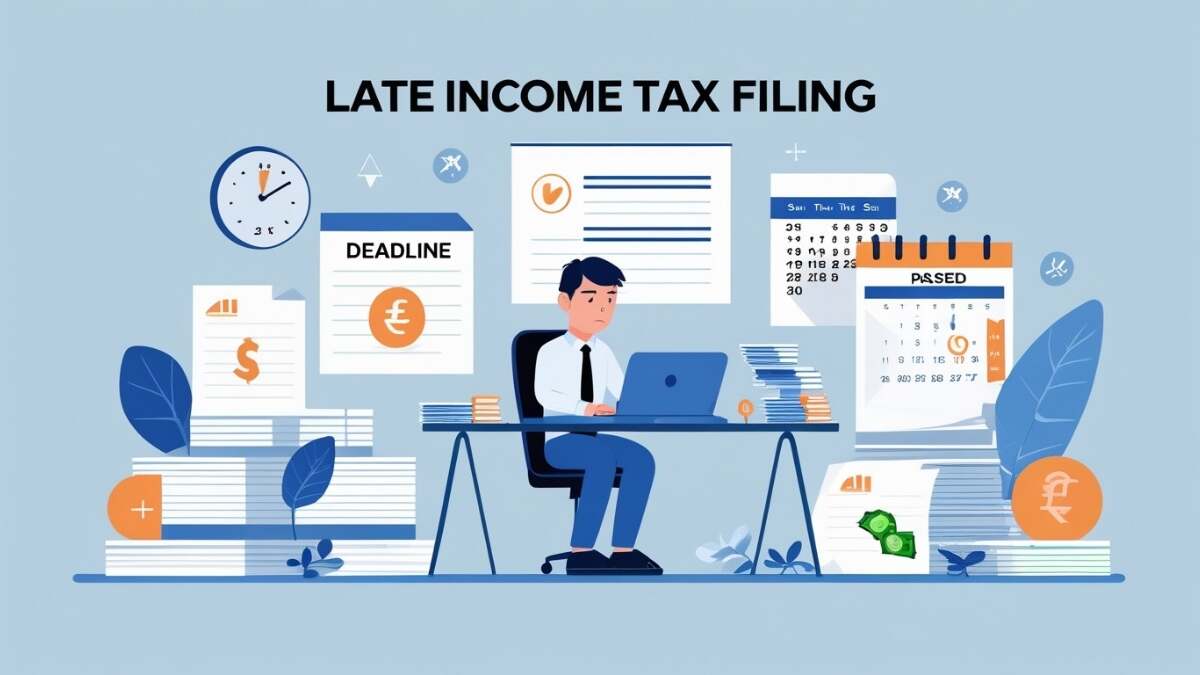Even if a taxpayer has missed the deadline, filing a late return helps them stay in compliance.
Recognizing a late return
According to section 139(4) of the Income-tax Act, a belated return is one that is filed beyond the deadline. It allows taxpayers to claim deductions, disclose income, and pay taxes even after the deadline has passed. Late filing is a more sensible and practical strategy to ensure timely compliance since it will result in fines, deny some relief, and put taxpayers in the spotlight.
The late return deadline
The conclusion of the applicable assessment year, usually March 31 following the fiscal year, is the deadline for filing a delayed return. For instance, a belated return for income received in FY 2024–2025 may be submitted up to March 31, 2026. Taxpayers should not wait until the last minute since last-minute mistakes or technological difficulties might cause problems and leave little time to fix them.
Late fines and penalties
Filing a return late might have financial repercussions. If your income is less than ₹5 lakh, you may pay ₹1,000 instead of the maximum ₹5,000 late filing fee required under section 234F. In addition, delinquent taxes may be subject to interest under sections 234A, 234B, and 234C. Risks associated with late returns include postponed reimbursements and the loss of certain exemptions and allowances to which a timely return is qualifying.
How to submit a late return
Submitting a late return follows the same steps as submitting a normal return. When completing an ITR form, taxpayers must choose “Return submitted under section 139(4)” after logging in to the income tax e-filing system and selecting the appropriate assessment year. Before submitting it, they must accurately input their income, deductions, and taxes paid. Following submission, the return has to be validated either physically or electronically.
Making up for the delayed return
Until recently, it was not possible to alter delayed returns. Nevertheless, the regulations now permit changes at the conclusion of the assessment year or prior to the completion of the assessment, whichever comes first. As a result, taxpayers may fix factual mistakes in their income, tax credits, or deductions. Taxpayers who submit delayed returns should, however, double-check facts in advance to prevent errors that may need adjustment later since periods are short.
Why it is important to file on time
While late returns are acceptable, it is preferable to file on time. In addition to faster reimbursements and a lower chance of fines or departmental notices, timely filing guarantees access to all allowable deductions. Additionally, it facilitates the use of returns as proof of income for investments, loans, and visas. Taxpayers should see late filing as a choice, not a replacement for being on time and meeting deadlines.
Frequently Asked Questions
Is it possible to claim deductions on a late return?
It is possible to claim deductions under sections 80C, 80D, and 80G. If you miss the first deadline, you will not be eligible for some benefits, such as capital losses or the carryover of business losses.
What happens if I also miss the deadline for the overdue return?
Unless the tax department excuses the delay, you will not be able to file your ITR for the year if you miss the deadline for the delayed return. In some situations, you may forfeit your refunds and incur penalties for failing to file.
Do I have a better chance of getting a refund if I file a delayed return?
Indeed, late returns often result in slower refunds than early ones. Taxpayers with an extension have to wait longer for any refund since returns that are submitted on or before the deadline are prioritized.
Is it possible to fix a late return if I make a mistake?
Indeed, even late reports may be updated as long as they are submitted before the end of the assessment year or before the assessment is finished. If you forgot to add income or deductions in your first late return, this might help.

